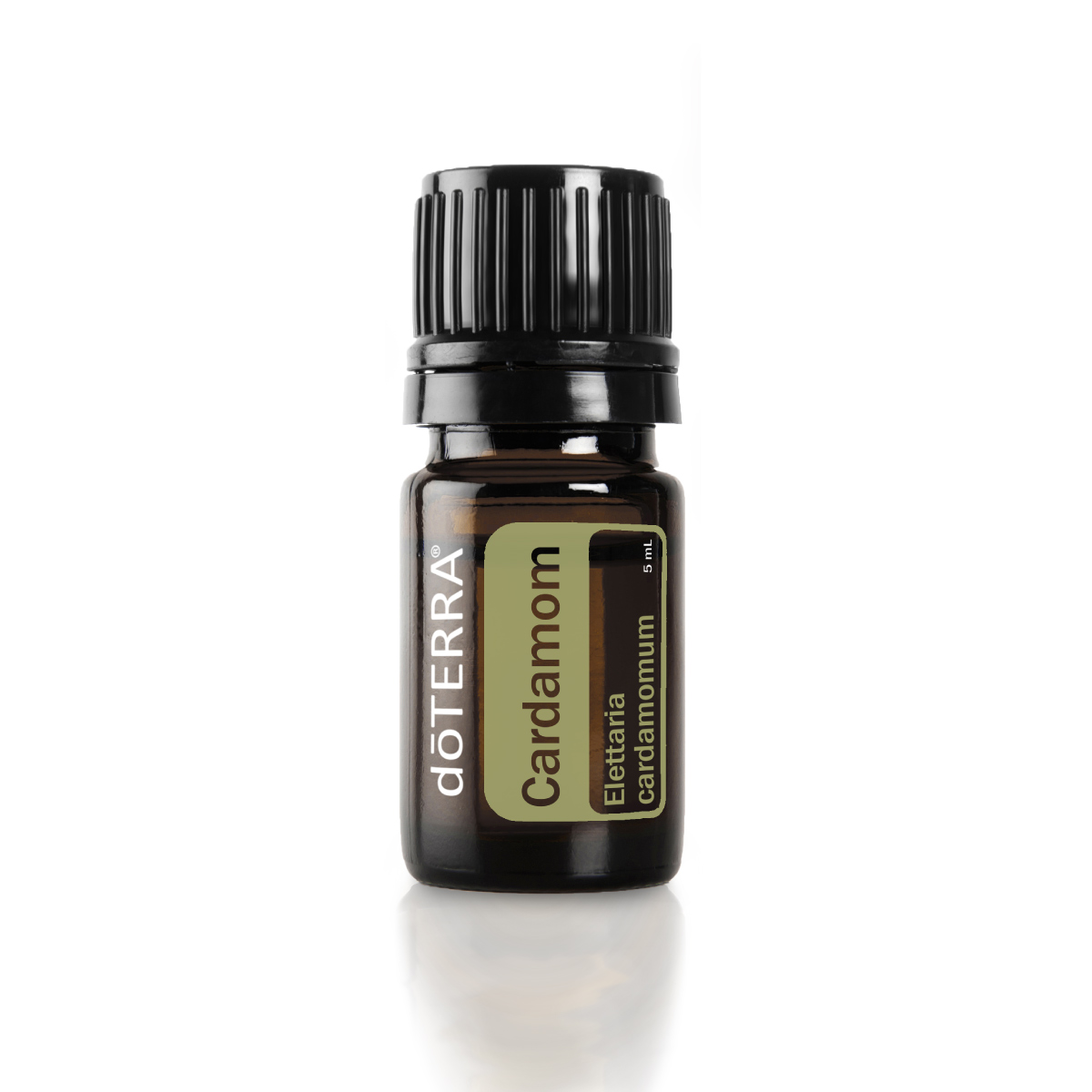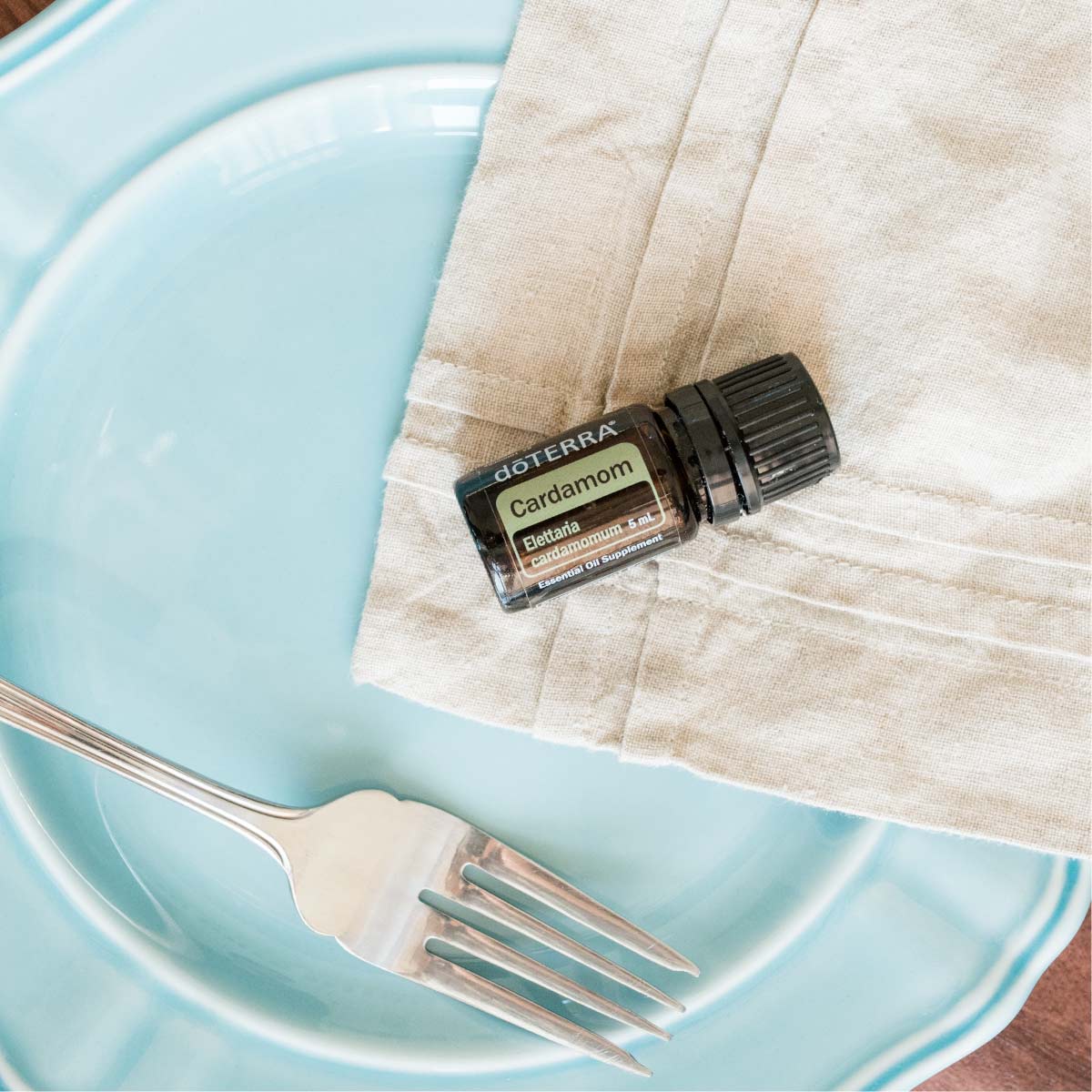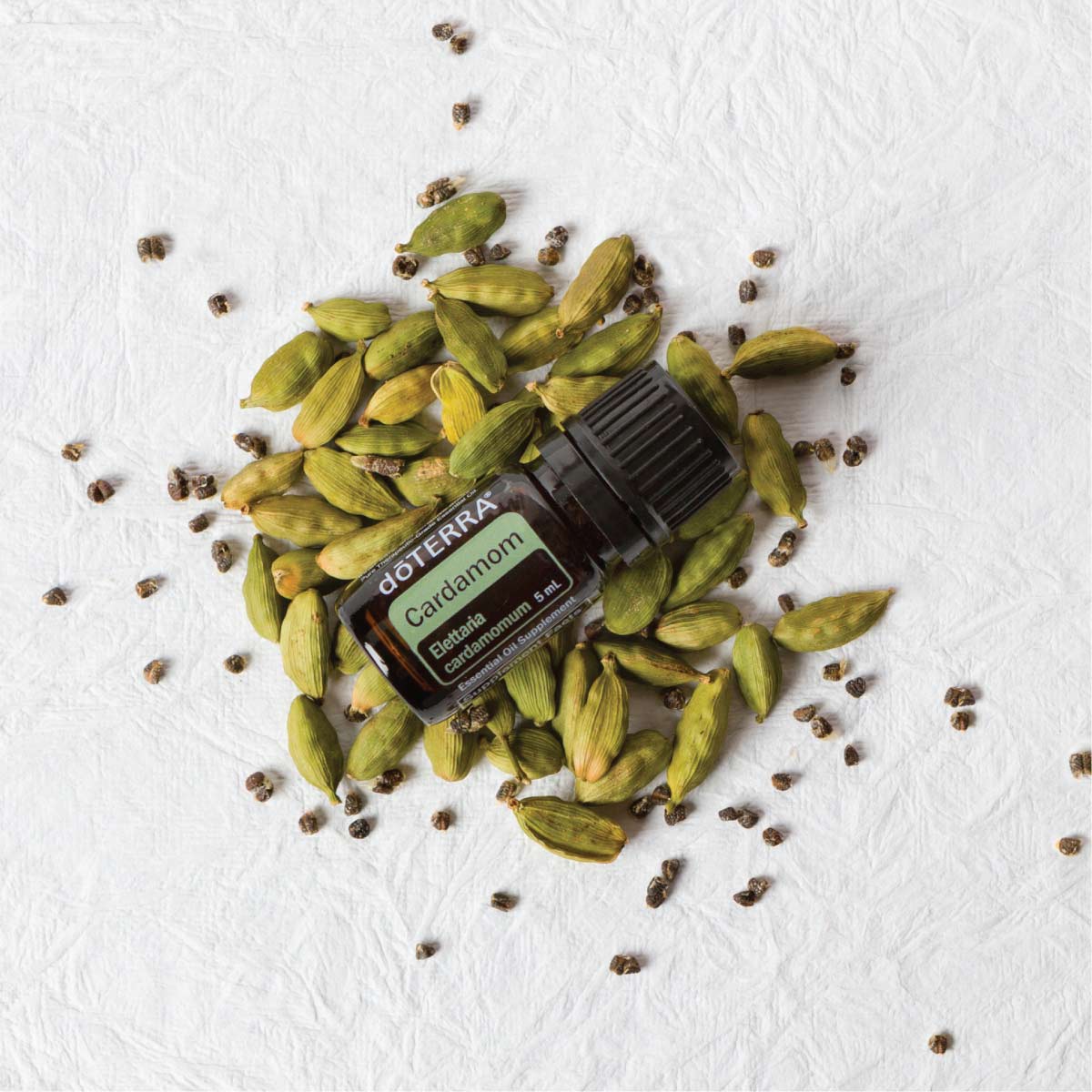Origin: a Latin derivative
meaning "Gift of the Earth."
- Shop
-
Our Story
- View Our Story Home
- Who We Are. . . .
- What We Do. . . .
- Why We Do It. . . .
-
dōTERRA[doh-teh-ruh]
Cardamom Oil Uses and Benefits
Essential Oil Spotlight
Essential Oil Spotlight


Cardamom Oil Product Description
Known as the “queen of spices” in the cooking world, cardamom is a popular spice used around the globe in a variety of dishes. While cardamom is a flavorful, distinctive spice, the essential oil that comes from cardamom seeds has uses that reach far beyond the kitchen. With calming and soothing properties, Cardamom essential oil can ease digestion,* promote feelings of clear breathing,* alleviate stomach discomfort,* and more.

Where to Buy Cardamom Oil
If you are ready to buy your own Cardamom essential oil, visit our Cardamom oil page to learn more about ordering. Whether you plan to use Cardamom oil for cooking, topical application, or aromatically, you’ll want to ensure that you are using pure and potent oil. Through Co-Impact Sourcing®, doTERRA ensures the quality and efficiency of the harvesting and distillation process that the cardamom seeds undergo. Close relationships with growers and distillers in Guatemala allow doTERRA to produce high quality, potent oil through a proprietary distillation process.
Cardamom Oil Uses and Benefits
- Freshly ground Cardamom seeds are used widely in the culinary world; you can use Cardamom oil in place of cardamom seeds to enhance the flavor of many recipes. The minty flavor and scent of Cardamom has made it a popular ingredient in traditional Indian sweets and teas. It is also used in curry dishes due to its warm, spicy aroma and flavor. As a companion to coffees, teas, sauces, and pastries, Cardamom is truly “queen of the spices.” Next time you are cooking, consider adding Cardamom oil to breads, smoothies, meats, and salads to enrich food flavor and to aid digestion.*
- Another internal benefit of Cardamom essential oil is its ability to promote clear airways and breathing and aid in respiratory health.* It is a key ingredient in the doTERRA Breathe® Respiratory Blend and Respiratory Drops.

- The chemical makeup of Cardamom essential oil makes it a calming oil—allowing it to provide soothing effects for the digestive system when ingested. Cardamom oil can be used to slow down muscle contractions in the intestines and to ease bowel looseness,* which is why it is commonly taken to aid in digestion.* Consider taking Cardamom oil internally when experiencing occasional feelings of stomach discomfort, or after over-indulging at dinner.* When taken internally, it is best to dilute one drop of Cardamom oil in 4 oz. of liquid.
- Just as Cardamom oil can be used to calm the digestive system, its aroma can also be calming and soothing. When using Cardamom essential oil to promote a sense of openness or feelings of mental clarity, consider diffusing the oil in the essential oil diffuser of your choice. Diffusing Cardamom oil helps promote a sense of a clear head, offering an overall soothing and calming feeling.
- The calming and soothing properties of Cardamom essential oil can also be experienced when used topically. When you want to soothe or cool your skin, apply Cardamom oil on the skin for a cooling, refreshing sensation. Remember, when applying Cardamom essential oil to the skin, apply one or two drops to the area and dilute the oil with doTERRA Fractionated Coconut Oil to help avoid skin irritation or sensitivity.
- Cardamom essential oil has a unique, pungent aroma that makes it useful around the home when you want an inviting, warm scent to fill the room. Cardamom oil’s spicy, warm, balsamic aroma is the perfect addition to any cozy home—particularly in the fall and winter. If you want to spread the unique fragrance of Cardamom essential oil around your own home, try making your own potpourri with Cardamom oil. You can place it anywhere you want a spicy and warm aroma.
Plant Description
A member of the ginger family, cardamom is widely known for its applications in the culinary world. This perennial is native to Southeast Asia and produces flavorful and aromatic seeds that have many uses—including being harvested for essential oil. Though the plant is popular in several areas throughout the world, it is one of Guatemala’s top export products, and the labor-intensive harvesting process makes it one of the most expensive spices worldwide.
Chemistry of Cardamom Oil
Main Chemical Components: Terpinyl acetate, 1,8-cineole, linalyl acetate, sabinene, linalool
Cardamom is made up of monoterpenoid esters called terpinyl acetate and linalyl acetate. Other oils like Lavender, Clary Sage, and Roman Chamomile also contain monoterpenoid esters, which is why these oils are commonly known for their calming and soothing properties. Due to the high quality production process, doTERRA Cardamom essential oil contains higher amounts of 1,8-cineole than other cardamom essential oils. 1,8-cineole, or eucalyptol, is a monoterpenoid that is commonly known for its positive effects. This chemical component contributes to Cardamom oil’s ability to promote feelings of clear airways and easy breathing.*
Oils that blend well with Cardamom oil
As a versatile, soothing oil, Cardamom blends well with warm, spicy oils, as well as florals and citrus oils. Whether you are creating your own essential oil diffuser blend, or looking for the best companion for Cardamom, consider using Cinnamon, Clove, Ginger, Cedarwood, Sandalwood, Vetiver, Fennel, Patchouli, Ylang Ylang, or citrus essential oils.

Sourcing
doTERRA Cardamom essential oil is produced from cardamom seeds grown in Guatemala, where doTERRA has established a Co-Impact Sourcing initiative to help local growers improve their quality of life. By providing a new drying facility for the cardamom plants in Sika’abe, Guatemala, doTERRA has helped improve the efficiency of the cardamom harvesting and production process. Before, cardamom growers had to travel far distances to dry the product, which was problematic due to the short shelf life of cardamom seeds. Aside from aiding with equipment and production processes, doTERRA has provided help for cardamom growers in Guatemala by offering education regarding growing, harvesting, and other agricultural activities. This education process has come as a result of efforts of the doTERRA Healing Hands Foundation™.
In the Polochic region of Guatemala, the doTERRA Healing Hands Foundation partnered with CHOICE Humanitarian to fund the construction of the Sika’abe Training Center—a center that serves as a learning center for community members. At the Sika’abe center, individuals receive certifications and attend classes that teach job skills, new agricultural practices, and more. The objective of this training center is to help families in this area of Guatemala lift themselves out of poverty.
To learn more about the Co-Impact Sourcing initiative in Guatemala, visit these links:
Co-Impact Sourcing Cardamom
Finding New Pathways
Cautions
Possible skin sensitivity. Keep out of reach of children. If you are pregnant, nursing, or under a doctor’s care, consult your physician. Avoid contact with eyes, inner ears, and sensitive areas.
-
Copied to clipboard
- Download


